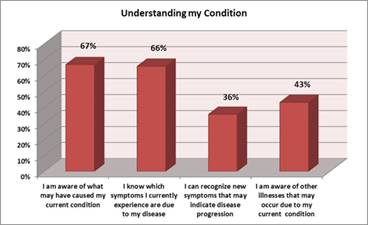
A field survey was conducted to identify CARRE end-user expectations in order to give user feedback for the definition of CARRE use cases and functional requirements. The survey targeted all types of potential CARRE end users, namely: patients with cardio renal disease and with or at risk of comorbidities and/or their carers – responses from 389 patients;
Significant results of the patient survey (389 respondents) include:
‒ “Understanding my condition”: The majority of respondents report that they are aware of what caused their condition and which symptoms can be attributed to their condition. However, less than half report that are aware of new illnesses that may occur due to inefficient management of current condition. Even less can recognize new symptoms that may indicate disease progression.
‒ “Getting information on my condition”: The majority values information on their condition, find it easy to understand and want to receive it regularly. Also, the majority feels able to manage information on disease progression and also feel that they have the information they need for to understand and manage their condition. However, less than half feel they have information they need to understand disease progression. Also, more than half feel anxious when receiving new information about their disease.
‒ “Empowerment vs. Guidance”: The majority wants to be fully informed and needs more information in order to commit to therapy and lifestyle changes. However, less than half prefer to search for medical information on their own. Also, the majority prefer to discuss their condition with their doctor, but only about half discuss it with fellow patients. About half prefer to rely only on doctor’s knowledge and guidance. The majority prefers their doctor to decide on the best treatment, but when alternatives are available the majority prefers to make the final decision.
‒ “Technology and Disease Management”: Only about half of respondents use the internet as a source of medical information, and even less than half feel able to recognize which internet source provides accurate medical information. However, a good majority would be willing to use applications to monitor and manage diet and physical activity, applications that provide medical alerts and a single web portal to gather and access vital information about their condition.
‒ Statistically significant sex differences: Women appeared to report higher percentages of agreement with the statement on their awareness about possible disease progression due to insufficient management of current condition. Also, women appear to be more willing to monitor their condition. However, men appear to be more confident in searching for medical information on their own.
‒ Statistically significant age differences: Older participants seem to feel less able to manage the information they receive about their disease. In line with this finding, they also seem to report more often confused by any new information and in turn, that it is more often difficult for them to manage the new information regarding their disease. Participants from the two younger age groups, especially those aged 46-65 years, report more often the need to have more information about their condition. For example, a higher percentage declares need for more information about their disease so as to understand their condition or to be committed to a therapy. Interestingly enough, younger participants do not seem to prefer their doctor to take solely decisions about their therapy. Instead, the older participants seem to feel well with this option. Regarding the use of technology, the older participants seem to feel unsafe with the new technology as a mean for the better management of their disease. On the contrary, significant portions of younger age groups estimate the role of new technology as being helpful for the management of their condition. Also, they seem to be willing to monitor themselves and record data on their daily activities, to use an application that would help them to manage these daily activities (e.g. diet) or their physical condition, and to use an application that would provide alerts to them regarding their condition and its progression.
Author: Stefanos Roumeliotis (DUTH), Kalliopi Pafili (DUTH), Neringa Karvelyte (VULSK)
Date: 10 April 2014






